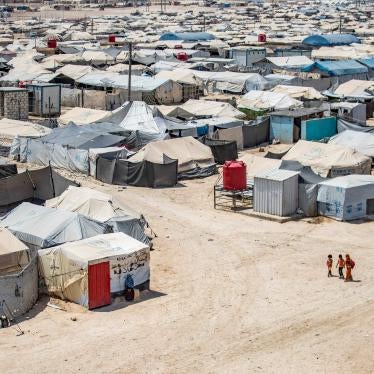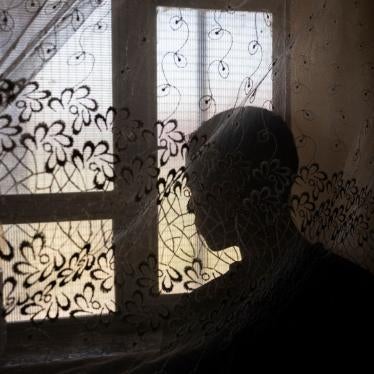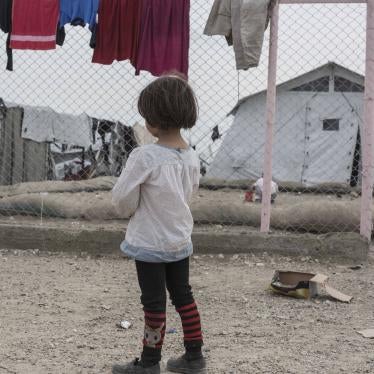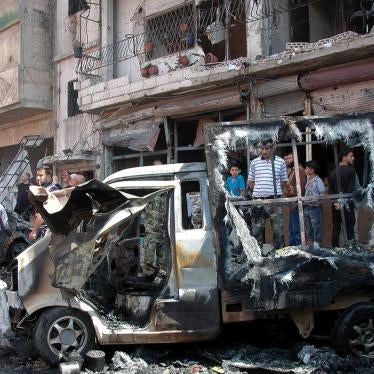(Sydney, March 2, 2024) – An Australian youth forced as a child to live under the Islamic State, who was believed to have died while wrongfully detained by anti-ISIS forces, appears to be alive in a prison in northeast Syria, Human Rights Watch said today. The Australian government should take immediate steps to confirm whether the young man is Yusuf Zahab and repatriate him.
During an interview videotaped on February 25, 2024, and subsequently aired on Australian media, the young man said he was Sydney-born Yusuf Zahab, who was reported missing in January 2022 during a battle between the Islamic State (ISIS) and US- and UK-backed, Kurdish-led forces at a prison in al-Hasakeh, northeast Syria. A close family member told Human Rights Watch that relatives “have no doubt” that the youth in the video is Zahab.
“The great news that Yusuf Zahab appears to have been found alive is tempered by the apparent failure of the Australian government to locate him for two long years,” said Letta Tayler, associate crisis and conflict director at Human Rights Watch. “Australian authorities should promptly confirm whether this man is Zahab and reinvigorate their efforts to bring home each and every Australian still held in northeast Syria.”
The family member said the videotaped interview prompted a “roller coaster” of emotions. “At first we were overjoyed, but then you go from pure joy to grief to anger. And then you think, okay now we know where he is, where do we go from here, and you realize you have so many questions and no one is giving you answers.”
Family members in Australia said Zahab was taken to Syria in early 2015, when he was 11, by adult relatives to live under ISIS rule. A predominantly Kurdish regional force, backed by a US-led international coalition that includes Australia, captured him and his relatives in early 2019, during the fall of the so-called ISIS caliphate.
The forces separated Zahab from his family and detained him in a severely overcrowded prison in al-Hasakeh holding thousands of foreign men suspected of ISIS links. The prison detainees were held incommunicado; lacked adequate food, water, and medical care; and had no way to contest the legality or necessity of their detention. In 2021, the family received word that Zahab had contracted tuberculosis, which was rampant in the prison.
In desperate voice messages to Human Rights Watch in January 2022, Zahab begged for help, saying he was wounded in the head and one arm as ISIS and Kurdish-led forces fought for control of the prison. About 500 detainees, fighters on both sides, and guards were killed during the battle, sparked by an ISIS takeover of the prison. Regional authorities have never answered questions on the number of the dead, injured, and missing, or on how many were children.
Since the fighting at the prison, conflicting accounts have emerged about what happened to Zahab. In July 2022, family members announced that Zahab was dead and held a memorial service for him. Human Rights Watch also reported at that time that he was dead, based on information from family members and sources close to the authorities in northeast Syria. In August 2023, a video emerged of a detainee in northeast Syria whom family members believed to be Zahab, allegedly from September 2022, but relatives received no proof that he was still alive. Human Rights Watch and others had also received isolated, secondhand reports that he had been seen in detention since the 2022 prison battle.
Neither the Australian government nor the Kurdish-led authorities governing northeast Syria have commented on whether Zahab was alive or dead, despite repeated inquiries from United Nations representatives, Human Rights Watch, and the media.
In the February 25 interview on the Australian network SBS, a young man with an Australian accent identifies himself as Zahab. An SBS story accompanying the brief video interview said the man was in his early 20s. Speaking from an undisclosed location that the report says is in northeast Syria, the man tells an SBS Dateline reporter, Colin Cosier, that he was taken by older relatives from Australia to Syria in 2015 after a vacation in neighboring Lebanon and Türkiye. He said he had no idea that his relatives were going to Syria until they crossed the border.
“I went through a lot of stuff, mostly bad,” the man said, his voice cracking. “I wish to go back to Australia. I wish to go back to my normal life I used to live 10 years ago. I wish to see my family again. … I think about them day and night.”
The Australian government told SBS it cannot comment on the SBS report for privacy reasons, but that the authorities are providing consular assistance to the family of a man currently detained in Syria. The close family member told Human Rights Watch that relatives are in contact with Australia’s Department of Foreign Affairs and Trade but are not receiving any consular assistance, and that there is “zero information flow.” To their knowledge, the family member said, Australian officials had not visited Zahab since 2019. At that time, they had promised to return.
Tens of thousands of Syrians and foreigners from nearly 60 countries, including about 40 Australian women and children and several Australian men, are entering a sixth year of unlawful detention in dire and often life-threatening conditions in camps and prisons for ISIS suspects and family members in northeast Syria. Most are children, and none of the foreigners have been locally charged or have a way to contest the necessity and legality of their detention.
The Australian government has repatriated 24 citizens but stalled on bringing home the rest. In 2023, a Federal Court judge dismissed an application from the humanitarian organization Save the Children that sought to compel the Australian government to repatriate 20 Australian children and 11 women from the camps.
Research by both Human Rights Watch and the then-UN special rapporteur on upholding human rights while countering terrorism, Fionnuala Ní Aoláin, found that the authorities in northeast Syria routinely separate foreign boys from their mothers in the camps when they approach adolescence and place them in locked “rehabilitation centers.” In many cases, boys that age are forcibly moved from these centers to prisons for adults that also hold young men captured as boys.
Human Rights Watch and the UN expert spoke with boys and mothers in the camps who were severely traumatized by the separations. Removing boys from their mothers without an expert determination that separation is in the best interest of the child is a grave violation of the Convention on the Rights of the Child. It also can hinder the authorities’ stated efforts to “rehabilitate” these children.
Two Australian boys in the camps are approaching adolescence, family members said. The boys’ families fear they will also be forcibly transferred to so-called rehabilitation centers and to adult prisons.
Human Rights Watch has repeatedly pressed Australia and other governments to repatriate their nationals who are unlawfully and indefinitely detained in northeast Syria for rehabilitation, reintegration, and prosecution of adults as appropriate.
“Yusuf Zahab’s case highlights the horrors of mass, indefinite detentions of ISIS suspects and their families in northeast Syria,” Tayler said. “Australia and all other governments should repatriate their citizens now and prosecute adults as appropriate, before any more die or go missing.”








